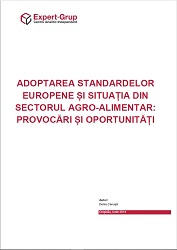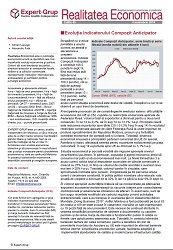

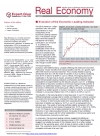
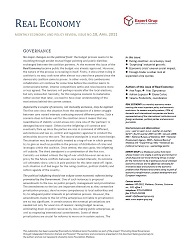
No major changes on the political front: the budget process seems to be muddling through amidst mutual finger pointing and public diatribes exchanged between the coalition partners. At the moment this issue of the Real Economy became public the budget was already approved. However, the nature of the process is revealing in itself. Firstly, it shows that ruling in coalition is no easy walk even after almost two years have passed since the democratic coalition came to power. In other words, this cumbersome cohabitation will continue for some time before the coalition learns to communicate better, internal competitions settle and roles become more or less agreed. The tensions will perhaps recede after the local elections, but only somewhat. Secondly, for this sanguine scenario to materialize rather sooner than later, we need to have clear understanding of the motivations behind the current unease.
More...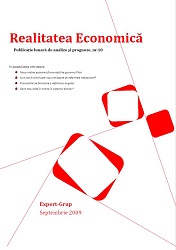
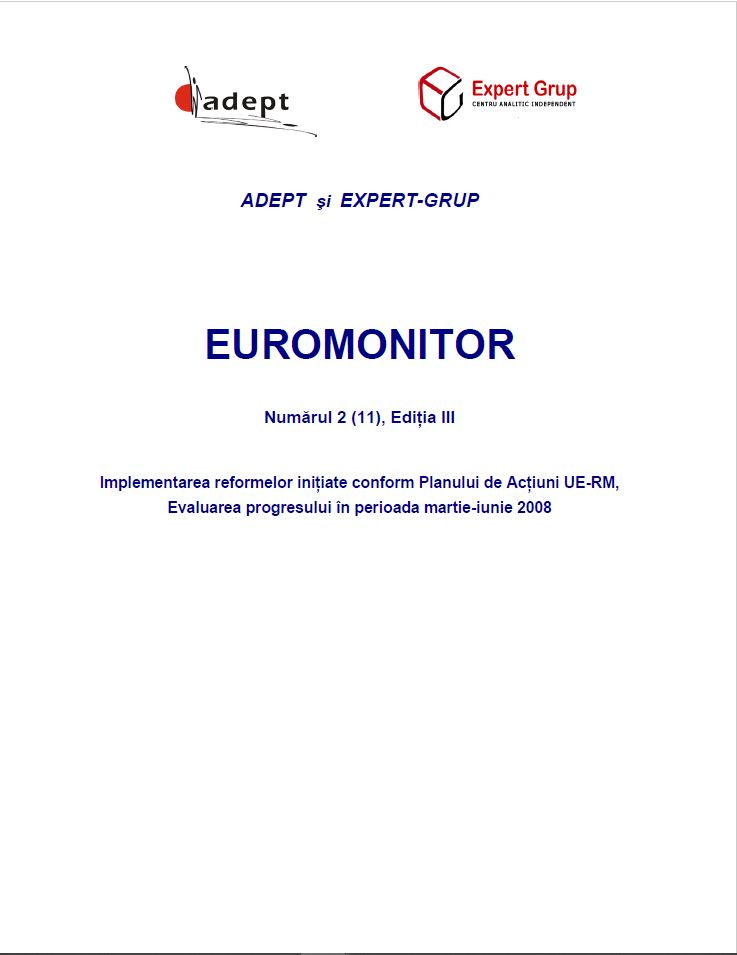
Keywords: Democratic institutions; Transnistria conflict; capacity of administration; juridical system; economic reforms; foreign trade; social development; human traffic; migration; border control;
The reports in the "Euromonitor" series aim at independent and objective monitoring of the implementation process of the Republic of Moldova - European Union Action Plan. The actions adopted and implemented by both signatories of the Plan will be monitored quarterly. The action plan is a complex document, structured in 7 chapters, which provides for the implementation of about 300 actions, some defined more or less precisely, others very ambiguous. Unable to monitor such a complex document, the authors of "Euromonitor" focused on priority actions, identified in the Action Plan itself.
More...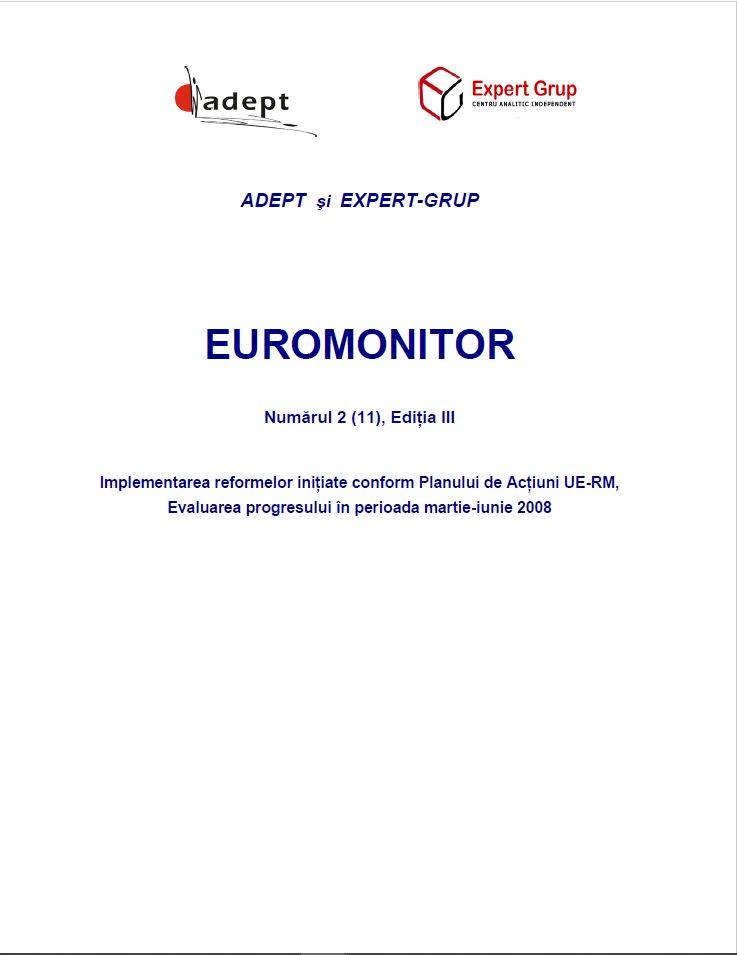
Keywords: Democratic institutions; Transnistria conflict; capacity of administration; juridical system; economic reforms; foreign trade; social development; human traffic; migration; border control;
The reports in the "Euromonitor" series aim at independent and objective monitoring of the implementation process of the Republic of Moldova - European Union Action Plan. The actions adopted and implemented by both signatories of the Plan will be monitored quarterly. The action plan is a complex document, structured in 7 chapters, which provides for the implementation of about 300 actions, some defined more or less precisely, others very ambiguous. Unable to monitor such a complex document, the authors of "Euromonitor" focused on priority actions, identified in the Action Plan itself.
More...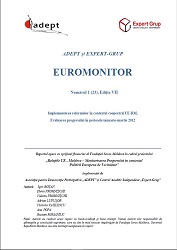
Keywords: Democratic institutions; Transnistria conflict; capacity of administration; juridical system; economic reforms; foreign trade; social development; human traffic; migration; border control;
The reports in the "Euromonitor" series aim at independent and objective monitoring of the implementation process of the Republic of Moldova - European Union Action Plan. The actions adopted and implemented by both signatories of the Plan will be monitored quarterly. The action plan is a complex document, structured in 7 chapters, which provides for the implementation of about 300 actions, some defined more or less precisely, others very ambiguous. Unable to monitor such a complex document, the authors of "Euromonitor" focused on priority actions, identified in the Action Plan itself.
More...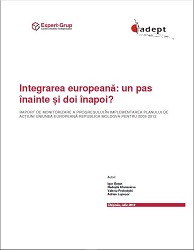
Keywords: Democratic institutions; Transnistria conflict; capacity of administration; juridical system; economic reforms; foreign trade; social development; migration; border control;
The purpose of the document is to develop an independent analysis of the policies and reforms implemented by the Chisinau authorities in order to bring them closer to the European Union, politically, economically and institutionally. In particular, the European Union - Republic of Moldova Action Plan (EUMAP) was monitored, which is the most important and exhaustive strategic planning document where all of Moldova's commitments in the European integration process are specified. Although the formal implementation period is 2005-2012, it has been automatically extended for an indefinite period. Moreover, the EUMAP remained current, given that the vast majority of the necessary priorities and actions specified in the plan are still relevant today.
More...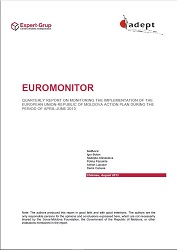
Keywords: Democratic institutions; Transnistria conflict; capacity of administration; juridical system; economic reforms; foreign trade; social development; migration; border control;
QUARTERLY REPORT FOR MONITORING THE PROGRESS IN IMPLEMENTING THE EU-MOLDOVA ACTION PLAN IN APRIL-JUNE 2013. // The quarterly report EUROMONITOR is based on 28 areas for which it shows the developments during the monitored period, assesses the impact of the action taken, and identifies major problems. The presentation of the initial situation (as of 2005) and of the current situation (as of 2012) is made on the basis of the conclusions made for the evaluation report covering the progress achieved in the period of 2005-2012, and it is focused on areas included into the report. The quarterly progress for 2013 has also been assessed along the areas included into the report.
More...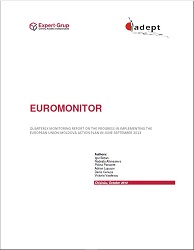
Keywords: Democratic institutions; Transnistria conflict; capacity of administration; juridical system; economic reforms; foreign trade; social development; migration; border control;
The quarterly monitoring Report on European Union – Moldova Action Plan (EURMAP) implementation during July-September 2013 is developed within the joint project "EU -Moldova - monitoring the progress in the Eastern Partnership 2013 " funded by the Soros Foundation –Moldova. // The quarterly report EUROMONITOR is based on 28 areas for which it shows the developments during the monitored period, assesses the impact of the action taken, and identifies major problems.
More...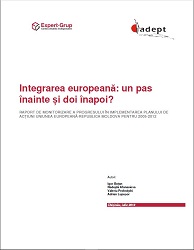
Keywords: Democratic institutions; Transnistria conflict; capacity of administration; juridical system; economic reforms; foreign trade; social development; migration; border control;
The reports in the "Euromonitor" series aim at independent and objective monitoring of the implementation process of the Republic of Moldova - European Union Action Plan. The actions adopted and implemented by both signatories of the Plan will be monitored quarterly. The action plan is a complex document, structured in 7 chapters, which provides for the implementation of about 300 actions, some defined more or less precisely, others very ambiguous. Unable to monitor such a complex document, the authors of "Euromonitor" focused on priority actions, identified in the Action Plan itself.
More...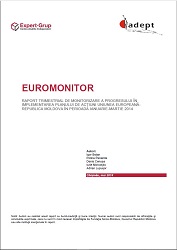
Keywords: Democratic institutions; Transnistria conflict; capacity of administration; juridical system; economic reforms; foreign trade; social development; migration; border control;
The reports in the "Euromonitor" series aim at independent and objective monitoring of the implementation process of the Republic of Moldova - European Union Action Plan. The actions adopted and implemented by both signatories of the Plan will be monitored quarterly. The action plan is a complex document, structured in 7 chapters, which provides for the implementation of about 300 actions, some defined more or less precisely, others very ambiguous. Unable to monitor such a complex document, the authors of "Euromonitor" focused on priority actions, identified in the Action Plan itself.
More...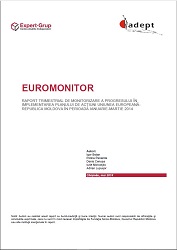
Keywords: Democratic institutions; Transnistria conflict; capacity of administration; juridical system; economic reforms; foreign trade; social development; migration; border control;
QUARTERLY MONITORING REPORT ON THE PROGRESS IN IMPLEMENTING THE EUROPEAN UNION–MOLDOVA ACTION PLAN IN JULY - SEPTEMBER 2014 // The reports in the "Euromonitor" series aim at independent and objective monitoring of the implementation process of the Republic of Moldova - European Union Action Plan. The actions adopted and implemented by both signatories of the Plan will be monitored quarterly. The action plan is a complex document, structured in 7 chapters, which provides for the implementation of about 300 actions, some defined more or less precisely, others very ambiguous. Unable to monitor such a complex document, the authors of "Euromonitor" focused on priority actions, identified in the Action Plan itself.
More...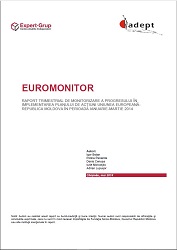
Keywords: Democratic institutions; Transnistria conflict; capacity of administration; juridical system; economic reforms; foreign trade; social development; migration; border control;
QUARTERLY REPORT ON MONITORING PROGRESS IN IMPLEMENTING THE EUROPEAN UNION-REPUBLIC OF MOLDOVA ACTION PLAN OCTOBER-DECEMBER 2014 // The reports in the "Euromonitor" series aim at independent and objective monitoring of the implementation process of the Republic of Moldova - European Union Action Plan. The actions adopted and implemented by both signatories of the Plan will be monitored quarterly. The action plan is a complex document, structured in 7 chapters, which provides for the implementation of about 300 actions, some defined more or less precisely, others very ambiguous. Unable to monitor such a complex document, the authors of "Euromonitor" focused on priority actions, identified in the Action Plan itself.
More...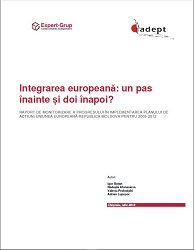
Keywords: Democratic institutions; Transnistria conflict; capacity of administration; juridical system; economic reforms; foreign trade; social development; migration; border control;
The Progress Report presents an analysis of how the Moldovan authorities have achieved the objectives set for the political, economic and institutional rapprochement with the European Union. The study includes the monitoring of the period from the signing on February 22, 2005 of the European Union - Moldova Action Plan, an exhaustive strategic planning document for the implementation of the Partnership and Cooperation Agreement (PCA), until the signing in 2014 of the Association Agreement between Moldova and the EU, which also includes the creation of the Deep and Comprehensive Free Trade Area (DCFTA). In the reference period, 2005-2014, the most important progress is related to the fulfillment of the political, institutional and economic conditions for the signing of the Association Agreement and the liberalization of the visa regime with the EU. Significant progress has been made in the area of respect for human rights, ensuring e-government, reforming the information technology and social services sector. Against this positive background, important shortcomings have been noted in a number of areas, in particular in the fight against corruption, in the banking sector, in the implementation of EU quality standards and in the energy sector.
More...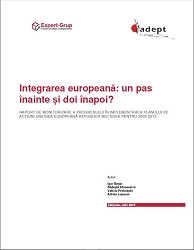
Keywords: Democratic institutions; Transnistria conflict; capacity of administration; juridical system; economic reforms; foreign trade; social development; migration; border control;
The document summarizes and analyzes the most important actions undertaken by the authorities in each of the areas monitored under the European Union - Moldova Action Plan, during 2014. The main developments and problems registered in the monitored chapters are further analyzed in a structured way.
More...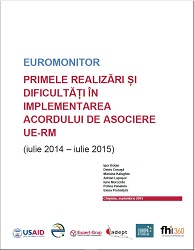
Keywords: Democratic institutions; Transnistria conflict; capacity of administration; juridical system; economic reforms; foreign trade; social development; migration; border control;
The first achievements and difficulties in implementing the EU-Moldova Association Agreement are the objects of monitoring the implementation process of the EU-Moldova Association Agreement between July 2014 and July 2015. The monitoring effort was carried out by the Association for Participatory Democracy ADEPT and the Independent Analytical Center Expert-Grup, and included the analysis of the degree of fulfillment of the commitments taken by the Moldovan authorities within the National Action Plan for the implementation of the Association Agreement Republic of Moldova - European Union for the years 2014-2016 (PNAA). // In the process of monitoring the implementation of the Association Agreement, the concrete commitments assumed by the national authorities in 23 policy areas, 15 areas related to economic cooperation and sectoral cooperation, and 10 areas related to the deep and comprehensive free trade area (DCFTA) were targeted. ). // As a result of the monitoring, we present in this report the synthesis of the evolutions for the monitored period referring to the progresses registered, but the arrears and problems that marked this period of implementation of the Association Agreement.
More...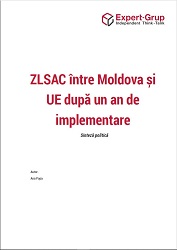
Keywords: Democratic institutions; Transnistria conflict; capacity of administration; juridical system; economic reforms; foreign trade; social development; migration; border control;
September 2015 marked the end of one year since the entry into force of the Deep and Comprehensive Free Trade Area (DCFTA) between the Republic of Moldova and the European Union (EU). This is certainly one of the greatest achievements in EU-Moldova relations. From the initial stages of the Association Agreement (AA) and DCFTA negotiation process, they have generated high expectations among supporters of European integration and fueled speculation by Eurosceptics. One year after the implementation of DCFTA begins, it is the right time to see to what extent these expectations have been met. // The first year after the implementation of DCFTA was marked by serious economic and political problems, both in the EU and in the Republic of Moldova, which affected the demand on the internal market and the confidence of the business environment, generating consequences for foreign trade activity and investments of both parties. Moreover, they were accentuated by the repercussions from Russia - an important trading partner for the Republic of Moldova and the EU (especially for some states). All these factors certainly distort the results of the first year of DCFTA implementation.
More...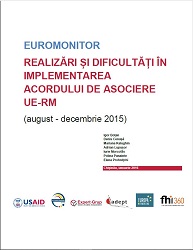
Keywords: Democratic institutions; Transnistria conflict; capacity of administration; juridical system; economic reforms; foreign trade; social development; migration; border control;
The reports in the "Euromonitor" series aim at independent and objective monitoring of the implementation process of the Republic of Moldova - European Union Action Plan. The actions adopted and implemented by both signatories of the Plan will be monitored quarterly. The action plan is a complex document, structured in 7 chapters, which provides for the implementation of about 300 actions, some defined more or less precisely, others very ambiguous. Unable to monitor such a complex document, the authors of "Euromonitor" focused on priority actions, identified in the Action Plan itself.
More...